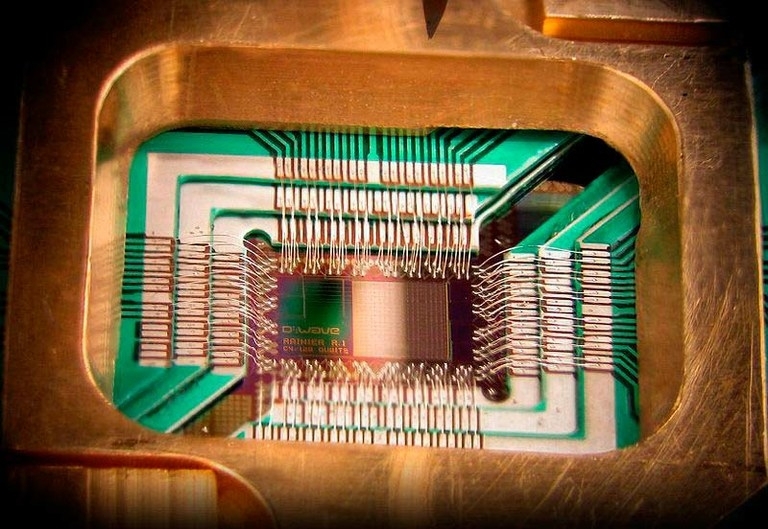

Example of a chip designed to operate in an experimental prototype quantum computer (image: Wikimedia Commons)
The result, obtained in collaboration with Chinese researchers, was published in Scientific Reports. The study could contribute to the development of quantum computing.
The result, obtained in collaboration with Chinese researchers, was published in Scientific Reports. The study could contribute to the development of quantum computing.

Example of a chip designed to operate in an experimental prototype quantum computer (image: Wikimedia Commons)
By José Tadeu Arantes
Agência FAPESP – Felipe Fanchini, a professor at the Department of Physics, School of Sciences, São Paulo State University (UNESP), Bauru, Brazil, has obtained an analytical solution for computing quantum discord. This is an important achievement because despite the efforts of the scientific community over the past decade, no accurate analytical solution had previously been found, even for the simplest possible systems, consisting of two quantum bits.
A paper co-authored by Fanchini and three Chinese researchers, entitled “Quantum Discord for d⊗2 Systems”, was published by Nature Publishing Group’s Scientific Reports. “On average, our analytical result diverges from the exact value by a factor of only 0.0001,” Fanchini told Agência FAPESP.
The article, the second by Fanchini that has been published in Scientific Reports in the last six months, is a result of the research project “A study of quantum correlations in open quantum systems”, supported by FAPESP. Agência FAPESP also reported on the previous paper.
Quantum discord is a concept that applies to any correlation between particles or groups of particles that infringes the laws of classical physics. Considered a global measure of quantum correlations, discord plays an important role in certain quantum information processes, hence the interest in studying it.
“Before the concept of ‘discord’ emerged, quantum correlations were understood only in terms of ‘entanglement’. It then became clear that weaker kinds of correlation are also possible,” Fanchini said.
Quantum entanglement occurs when pairs or groups of particles are generated or interact in ways such that the quantum state of each particle cannot be described independently of the quantum states of the others, however far apart they may be.
The practical applications of quantum discord include quantum communication, quantum cryptography, and, above all, quantum metrology, which exploits the laws of quantum mechanics to enable highly precise measurements of technologically significant parameters such as phase, frequency and magnetic field.
“The mathematical difficulties are such that only a few results exist for the analytical expression of quantum discord, and the exact solution is known only for very special states,” Fanchini said. “The methodology we used offers a new strategy for obtaining analytical solutions even when more complex systems are involved.”
Republish
The Agency FAPESP licenses news via Creative Commons (CC-BY-NC-ND) so that they can be republished free of charge and in a simple way by other digital or printed vehicles. Agência FAPESP must be credited as the source of the content being republished and the name of the reporter (if any) must be attributed. Using the HMTL button below allows compliance with these rules, detailed in Digital Republishing Policy FAPESP.





